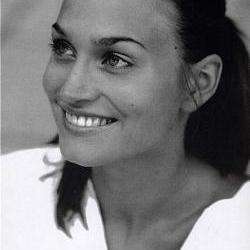The evening began on a fun note: Juliane Banse’s voice rang out in a pre-recorded message, reminding the audience that as far as she knew, cell phones and classical music did not generally mix. After a community chuckle, the audience applauded Banse, Bo Skovhus and Helmut Deutsch onto the stage, and then settled back into its seats for an evening of Hugo Wolf’s Italienisches Liederbuch.
Wolf has long been established as one of Lieder’s most significant figures. His marriage of text to music, the independence and also interdependence of his vocal and piano lines, and his ability to give different authors and styles their own unique musical settings are just a few of his considerable gifts to the genre. He wrote the collection of 46 songs known as the Italienisches Liederbuch based on Italian texts translated by Paul Heyse, and they are some of his last contributions to the genre. Among them are pearls that are now considered staples in Lieder repertoire including the fiery “Ich hab’ in Penna” and the intimate “Auch kleine Dinge”. Lesser-known but equally brilliant settings include the wide-eyed “Ihr junge Leute”, the fragile “O wär’ dein Haus durchsichtig wie ein Glas”, the comically brilliant “Wie lange schon war immer mein Verlangen”, and the slightly creepy “Geselle, woll’n wir uns in Kutten hüllen”.
Despite their brilliance and innovation, Wolf’s songs do not have the melodic sweep or ability to take up residence in the ear in the way of Schumann or Schubert. They are dense and complicated, and while in smaller groups they add delightful richness and interest to a program, in large quantities, like any wonderful spice, they are tough to take and threaten to ruin the broth. Listening to 46 Wolf songs, no matter how competently sung, interestingly grouped or beautifully played, is a lot to ask of an audience. Frankly, it’s a lot to ask of the musicians as well, and by the end of a long evening of Wolf, we were all tired.
Not that there weren’t wonderful moments. Helmut Deutsch had so many of them it was difficult to keep track, though his questionable decision not to use a page-turner gave an extra element of stress to a number of transitions. Regardless, difficult postlude after tricky interlude was delivered with charm, structure, and complete clarity of voicing and timing. His musical depiction of the amateur violinist–boyfriend to close “Wie lange schon” was comic poetry, and his sound in “Sterb’ ich, so hüllt in Blumen meine Glieder” could have melted any heart he chose. “Sterb’ ich...” also featured very nice text painting from Skovhus, something he did well throughout the evening. His rendition of “Und willst du deinen Liebsten sterben sehen”, to feathery rolls in the piano from Deutsch, was glorious. Moreover, Skovhus was a pleasure to watch, interacting strongly with his partner and fully committed to his work.
Banse, freshly clad in a yellow dress, was particularly charming during songs depicting characters with temperamental personalities. Her “Schweig einmal still” and “Wer rief dich denn?” were high points and her “Ihr jungen Leute” was very sweet. Though I would have enjoyed more vocal colors and less broad singing from her, she was a hit with the audience and played her roles well, being as effective and engaged when listening to Skovhus as when she was singing herself.
For whatever reason, it has become very popular in the last while to create programs that feel complete intellectually, but are not emotionally satisfying for either audience or artist. Although Wolf never meant this collection of songs to be thought of or presented as a cycle, it is terribly in vogue at the moment to present it in its entirety. In fact, the program notes for this concert even referred to the Italienisches Liederbuch as a “Liederzyklus” (song cycle), which is terribly misleading and robs the different female and male characters in the songs of their individuality and nuance. I personally hope that we can soon get back to a place where programs are constructed not to fulfill some questionable notion of completion, but instead in a way that has depth, variety and entertainment value for both our audiences and performers.


